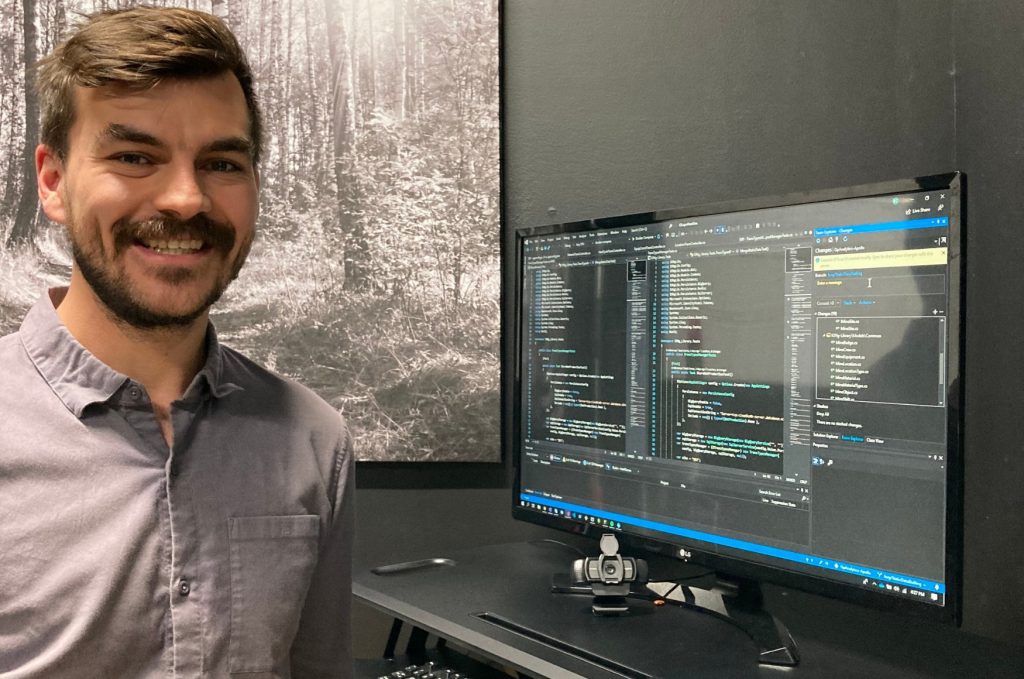As Co-op Student of the Year, Bachelor of Computer Science student Brad Crump encourages other students to take charge of their own career pathway. “Co-op is what you make it. I treated the experience as an opportunity to meet intelligent people and learn from them. This education has afforded several opportunities since including machine learning research with the Province of British Columbia. Co-op gave me the technical skills and confidence to embark on a career path in machine learning that I couldn’t envision before the program.”
Set to graduate in 2021, Crump continued his role as a software developer at Teck Resources after his two terms ended.
Born in Mackenzie, BC, Crump lived in Topley, BC, home to approximately 400 people. He graduated in a class of 42 in Houston, BC, and has fond memories of that homey feeling of a small town as well as close ties to his fellow graduates, who he describes as a “high achieving, academic bunch.”
Crump’s professional pathway has weaved through several avenues and access points, which he credits to following his intuition. Around his third year working in a sawmill, he decided the role wasn’t for him: “I was sure that I didn’t want to do this for the rest of my life. I wanted to do more than manual labour. That pushed me to venture somewhere else.”
Initially enrolled in a general arts degree, Crump enjoyed creative writing and philosophy courses, but felt pulled to go in another direction. A math class sparked his interest and led him to computing science. In a moment of career path uncertainty, he reached out to a friend who worked in IT. They affirmed that it was a fascinating industry, so Crump gave computing science a try. His first class was “challenging, to say the least,” he admitted, laughing. “I had no idea what I was doing in this class,” he said.
“I showed up way too early for the first day. I was so nervous: an unfamiliar building, unfamiliar people with an unfamiliar task. It felt empowering to push through that discomfort and give it a shot.”
Crump said he fell in love with that math course. Lecturer Saeed Rahmati shared one mathematic shortcut, which revolutionized how Crump saw math as a creative process. “It was a real lightbulb moment in that linear algebra class that snowballed from there.”
During his first winter semester, a presenter came to class to discuss co-op options. That piqued his interest and the rest is history. Crump worked with Dr. Nancy Bepple, co-op co-ordinator for computing science, math and physics, to find opportunities aligned with his goals. “Nancy is a source of inspiration — she’s great — she sees the potential in people and gets them to the right place.”
Bepple said of Crump: “Brad has taken every opportunity to weave his co-op experiences into his academic studies.
He also mentored other co-op students during his work term, and when Brad returned to campus, he collaborated with a faculty member on a research project on machine learning. He exemplifies how and why experiential learning is so valuable.”
Your resume is a roadmap
In his first co-op term as a data labeler, Crump recognized how previous work experience in milling and wildfire prevention helped him clinch the positions.
“I took my experience and turned it into something more: I used to flip lumber eight hours a day, and now I’m using machine learning to help predict forest fires. Don’t discount the experiences of any job.”
Understand the ‘why’
Crump suggests try to be objective and not be tied into the emotions or frustrations from repetitive tasks, or work that doesn’t quite make sense just yet. Understanding how a particular job connects to the bigger picture helps you appreciate your place in the process.
Ask management to expect more
If an employer doesn’t host high expectations for student employees, advocate for more challenges. “Help them set intentions and troubleshoot issues. The more you get to know your student, the more they’ll grow.”
Mood and mindset matters
Reflecting on his early co-op days, Crump acknowledges that he needed to be more patient with himself and others.
“Part of your professional responsibility is to contribute to the mood of your team with a good attitude. Checking your ego is critical. Be mindful of other people’s emotions and the impact you can have on others. It’s about emotional longevity.
Autonomy in remote learning
“The COVID-era has pushed me to work and think independently. You couldn’t just walk down the hall to ask a question; I found I was problem-solving more before reaching out to a colleague, ultimately bringing a more fully formed idea to the table. “
Get the experience and connections you need for a satisfying career. Explore the website for more info on Co-op and Career and Experiential Learning.


